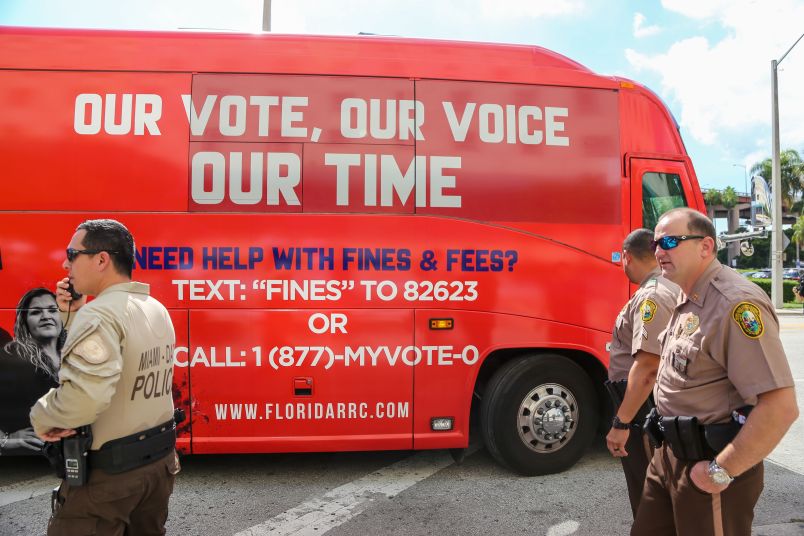This article is part of TPM Cafe, TPM’s home for opinion and news analysis.
In 2018, several elections in Florida went to a recount. Thus in 2020 with a presidential election on the horizon, and as a professor who teaches election law in Florida, I have watched the saga of trying to restore the right to vote to ex-felons with rapt attention. Whichever side wins this fight could help determine the winner of the White House.
In 2018, Florida voters shocked the masses when they voted by 64.5 percent to restore the right to vote to most ex-felons through a change to Florida’s Constitution called Amendment 4. But the Republican-controlled Florida legislature acted swiftly through legislation, Senate Bill 7066, to erect new barriers to the ability of returning citizens to register to vote by requiring them to pay all outstanding fees and fines first. The rights of hundreds of thousands of Floridians are now up in the air in an on-going court case challenging the Florida statute.
Before Amendment 4, persons with past felony convictions in Florida were disenfranchised for life unless the governor personally restored their voting rights. When Amendment 4 was passed headlines touted that Florida had restored the right to vote to 1.4 million ex-felons. The language of Amendment 4 stated: “any disqualification from voting arising from a felony conviction shall terminate and voting rights shall be restored upon completion of all terms of sentence including parole or probation.” Note, this does not say anything about fees or fines.
Yet, in January 2020 the Florida Supreme Court issued an advisory opinion at the request of Governor Ron DeSantis that clarified that Amendment 4 required the payment of fees and fines before voting rights could be restored. This might have been the end of the matter in a usual case. But the way that the Florida legislature acted raised federal Constitutional questions about whether they had created an illegal poll tax.
A lawsuit, Jones v. DeSantis, challenges Florida’s SB 7066 as unconstitutional under the Florida and U.S. Constitutions. The trial started last week via video conference due to COVID-19. But the case has already had quite the legal journey including a trip to the 11th Circuit Court of Appeals, which considered the impact of SB 7066 on 17 indigent ex-felons who lacked the ability to pay their fees and fines. The 11th Circuit concluded that Florida had no real interest in trying to collect fines from the truly poor, arguing, “[t]he State cannot draw blood from a stone.” The 11th Circuit decision meant that the 17 plaintiffs in the case could not be barred from voting in Florida simply because they were unable to pay their fees and fines. Under this ruling, a plaintiff who asserts inability to pay can register, and a plaintiff who shows inability to pay can vote. Now the case is back in front of the district court for further litigation on the merits including the question of whether SB 7066 is a poll tax.
The poll tax argument is that SB 7066 violates the 24th Amendment of the U.S. Constitution which states, “The right of citizens of the United States to vote in any primary or other election for President or Vice President, for electors for President or Vice President, or for Senator or Representative in Congress, shall not be denied or abridged by the United States or any state by reason of failure to pay any poll tax or other tax.” Thus because Florida’s ex-felons will have their voting rights hinge on the ability to pay the state, the Plaintiffs argue this violates the 24th Amendment. The state counters that this is not a “tax” in the usual sense as fees and fines are collateral consequences of the Plaintiffs’ original crime(s) and conviction(s).
With SB 7066, the 1.4 million Floridians who thought they had their voting rights restored by Amendment 4 could be cut in half. According to University of Florida Professor Daniel Smith, roughly three quarters of a million returning citizens in Florida may be unable to pay their outstanding fees or fines. (In the Jones case, all fines, fees and restitution imposed as part of a sentence are collectively referred to as “legal financial obligations” or “LFOs.”)
On April 7, Judge Hinke certified a class in the case as “consisting of all persons who would be eligible to vote in Florida but for unpaid financial obligations.” This makes the stakes in Jones v. DeSantis much higher. Instead of a case that only decides the fate of 17 plaintiffs, now it could empower — or crush — the voting rights of hundreds of thousands of Floridians.
If this case is decided by October 2020, when early voting starts in Florida, then it could impact who wins Florida’s key electoral college votes and thus the presidency. After all, in 2000, former President George W. Bush won Florida by a measly 537 votes. Clearly the potential voters litigating this case care about the outcome of Jones v. DeSantis. The nation should also keep an eye on whether the plaintiffs in the case prevail in a very purple state in a pivotal election year.
Ciara Torres-Spelliscy is a law professor at Stetson University, a Brennan Center Fellow and the author of “Political Brands.”






